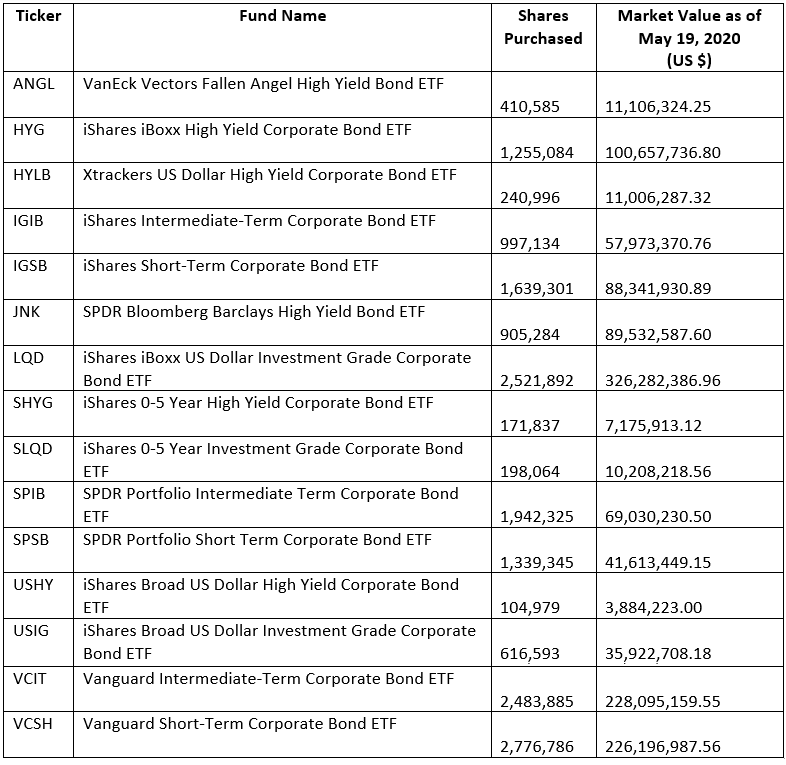The Federal Reserve is doing everything it can right now to help prop up the US economy and minimize the impact of the Covid-19 pandemic has on the economy, including purchasing ETFs.. The Fed has, by almost all market participants' views, acted very quickly, very aggressively, and rather decisively in their attempt to limit both the short and long-term effects this pandemic has on the US economy, despite the country permanently shutting down for nearly two months.
The first move by the Fed was to reduce interest rates by lowering the Federal Funds rate. Then, they began buying Treasury Bonds and mortgage-backed securities, (they have of course performed a number of other 'lending' type activities that have lower rates for lending and made it easier for more money to flow into the system, but for the average person knowing that the Fed lowered interest rates and started buying Treasury bonds and mortgage-backed securities, that is really the gist of it. To read more about the exact things they have done, check this article out.) Both these moves the Fed has done in the past, so no surprise there when they announced their plans.
However, in an attempt to pump liquidity back into the market, maintain low-interest rates, give business leaders and consumers the confidence they need to continue spending the Fed is now also buying Exchange Traded Funds.
Why are they buying ETFs and not something else?
Well, for a handful of reasons. First, the Fed is trying to buy corporate bonds. Buying corporate bonds is around the bought way of helping those companies during a difficult financial time. If a company needs to raise capital, as they do right now because they may not have revenue coming in, a cheap and easy way of doing that is selling bonds. But, if no one wants to buy those bonds because they fear the company may go out of business, then the loan terms on the bonds will not be very favorable for the company trying to sell them to raise capital so it can stay in business.
So, the Fed steps in and says, "yes we will buy your bonds and take on risk, and we will do it for a cheap price." That helps the business, helps increase confidence in the economy, and helps keep interest rates and loan terms low, so others can go to the bond markets and raise the capital they need.
But why not just buy a corporate bond directly from the companies trying to sell them?
Well, because that increases scrutiny on the Fed. For example, what if the Fed bought bonds from company A but not company B. Or what if company A did something in the past or future that didn't look very good from a political or environmental or human rights standpoint. Then people could blame the Fed for 'supporting' those businesses and, therefore, those behaviors.
However, if the Fed buys bond ETFs, which hold bonds in lots of different companies and the Fed buys a number of different bond ETFs, managed by a number of different ETF managers. The Fed, in theory, isolates itself from the sort of controversy that it could run into if it bought bonds directly from individual companies.
Furthermore, the Fed is also isolating itself from having a situation where they control the market from the standpoint of what the bond terms, i.e., interest rates, look like when the bonds are initially sold. If the Fed was the only one buying a particular business's bonds, they could dictate the terms. But since these bonds the Fed is ultimately buying, are being sold on the open market and then put into a bond ETF, the market as a whole is the one determining what the bond terms should ultimately be.
In addition to that, the Fed is working alongside Blackrock, an asset management company, to help facilitate the purchase of these ETFs. Which essentially means, Blackrock is taking direction from the Fed in terms of what kind of bond ETFs the Fed wants to buy, and Blackrock is then going out and picking which ETF and how much of each to buy.
So, what bond ETFs has the Fed bought, and how much of each?
Per the Federal Reserves website. This information includes the market value of ETF purchase transactions, which is the recorded value of all ETF transactions that have reached their contractual settlement date as of May 19, 2020.

Part Two of this piece will help you decide whether or not you should follow the Fed's footsteps and buy these funds or other bond ETFs, or whether you should find your own path and buy non-bond ETFs in the days, weeks, and months to come.
Matt Thalman
INO.com Contributor - ETFs
Follow me on Twitter @mthalman5513
Disclosure: This contributor held long positions in Apple, Tesla, Intel, Google, Amazon.com, Facebook, Priceline and Microsoft at the time this blog post was published. This article is the opinion of the contributor themselves. The above is a matter of opinion provided for general information purposes only and is not intended as investment advice. This contributor is not receiving compensation (other than from INO.com) for their opinion.

It is sick, perverted, unlawful, inappropriate. Feds have killed the capitalism, consequences will be terrible for the future if our country and the world.
Thanks !!!!!